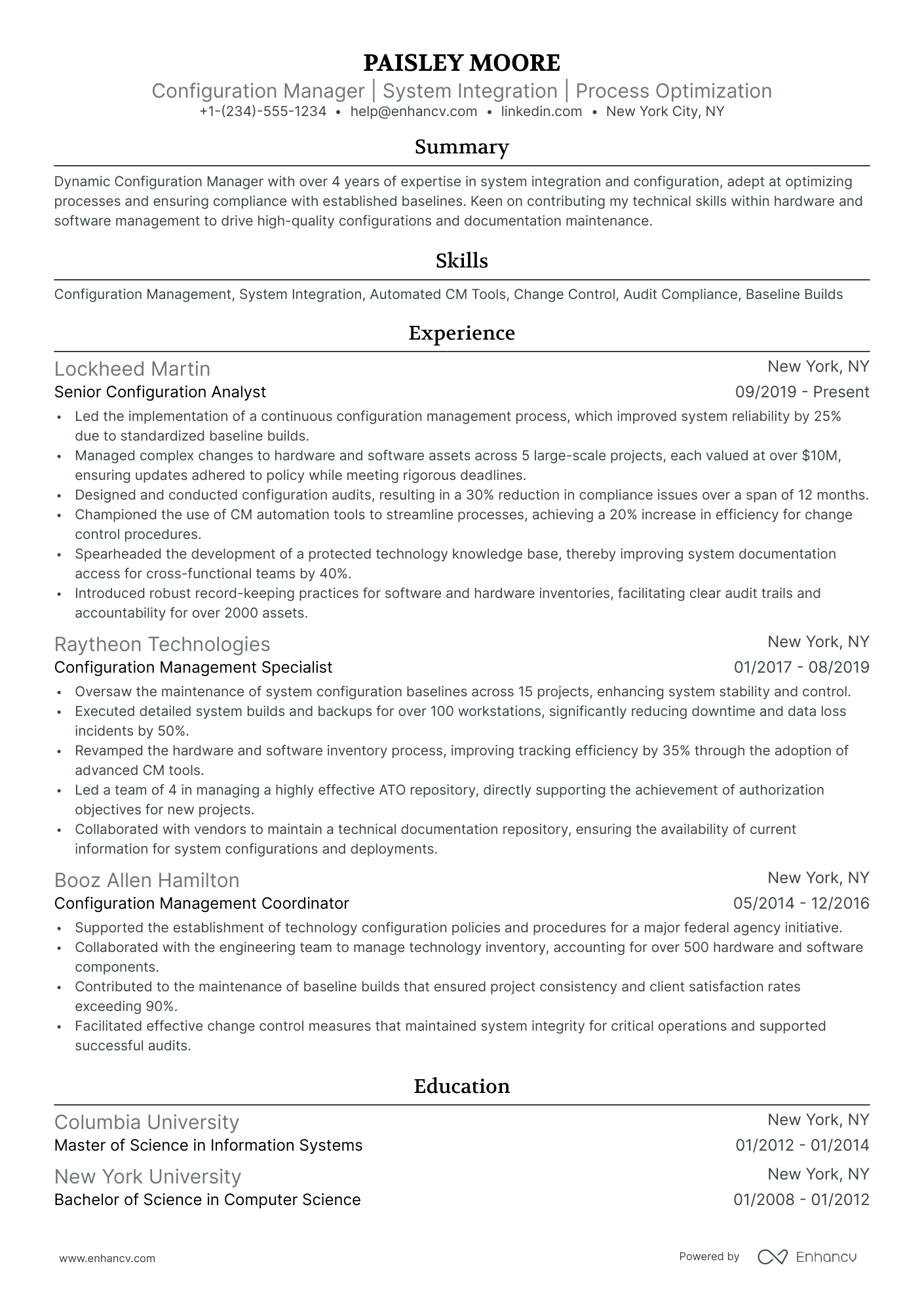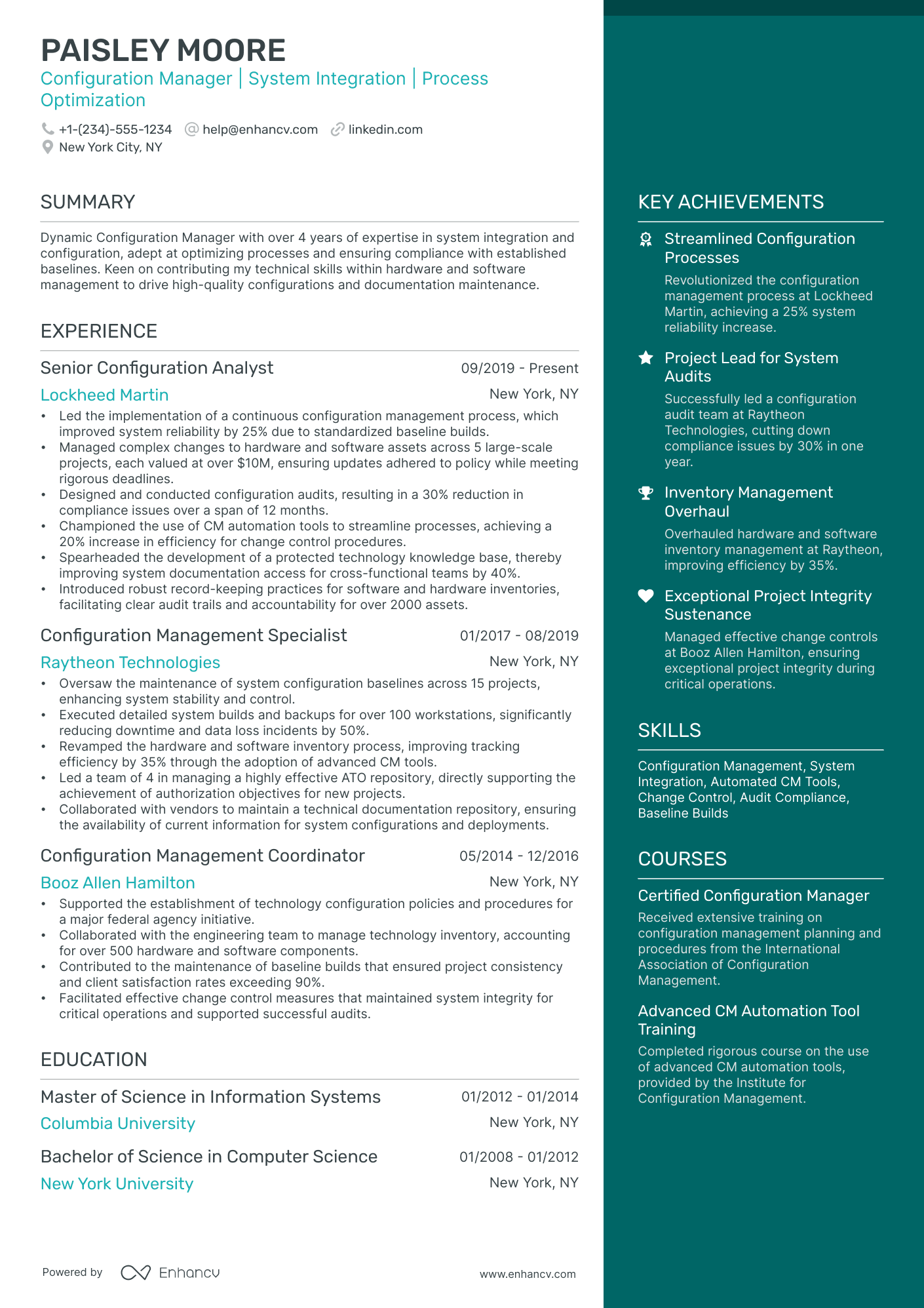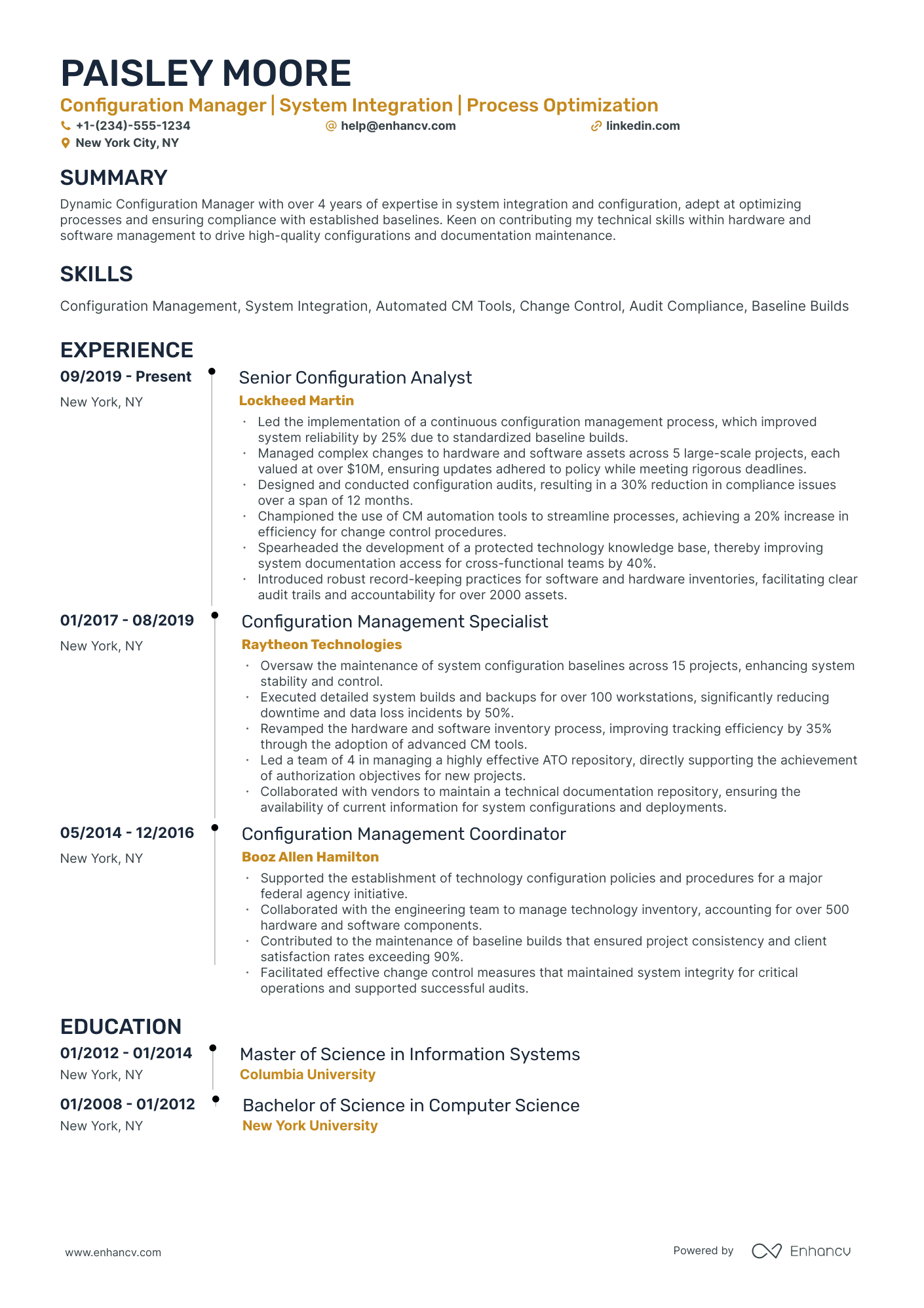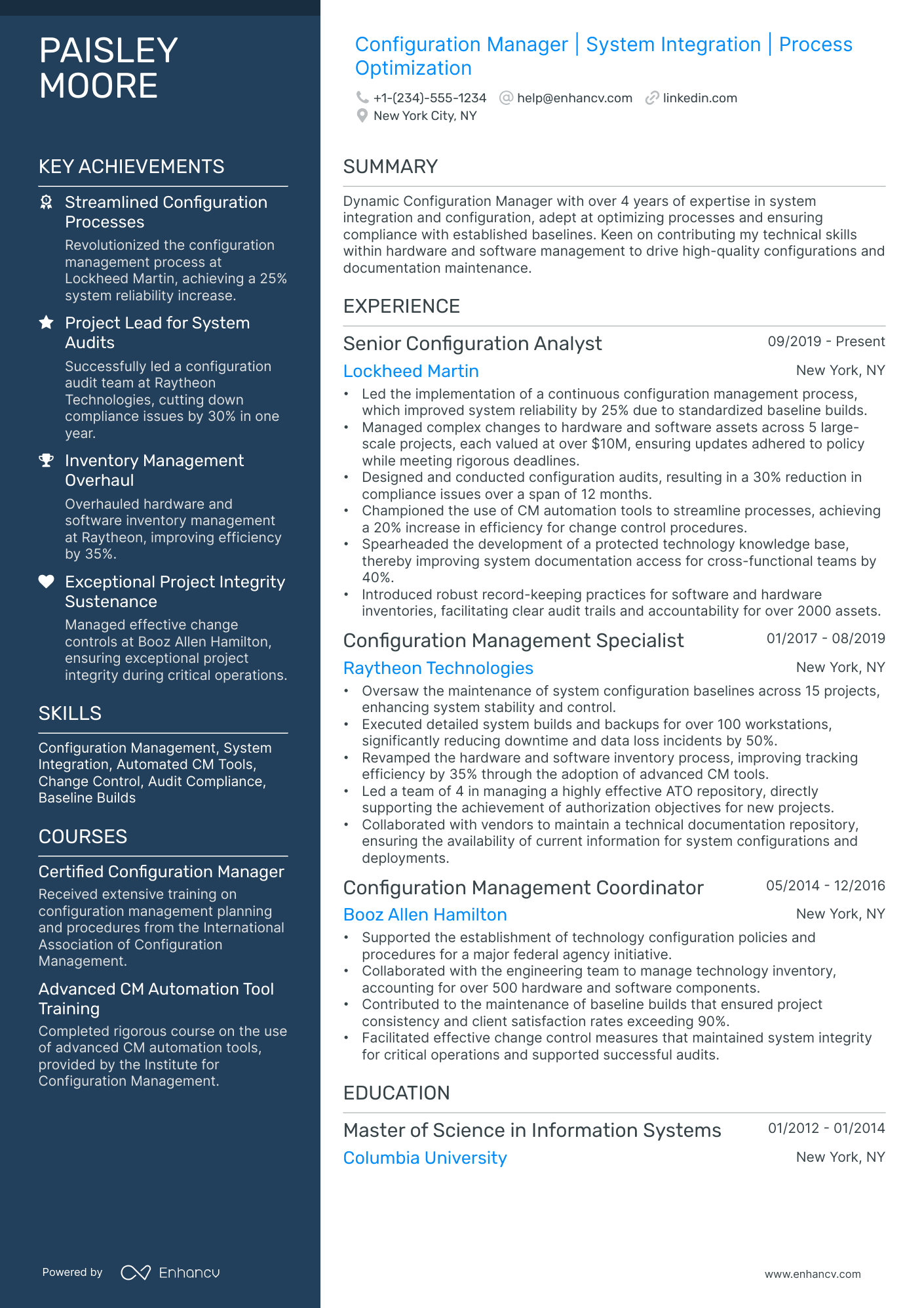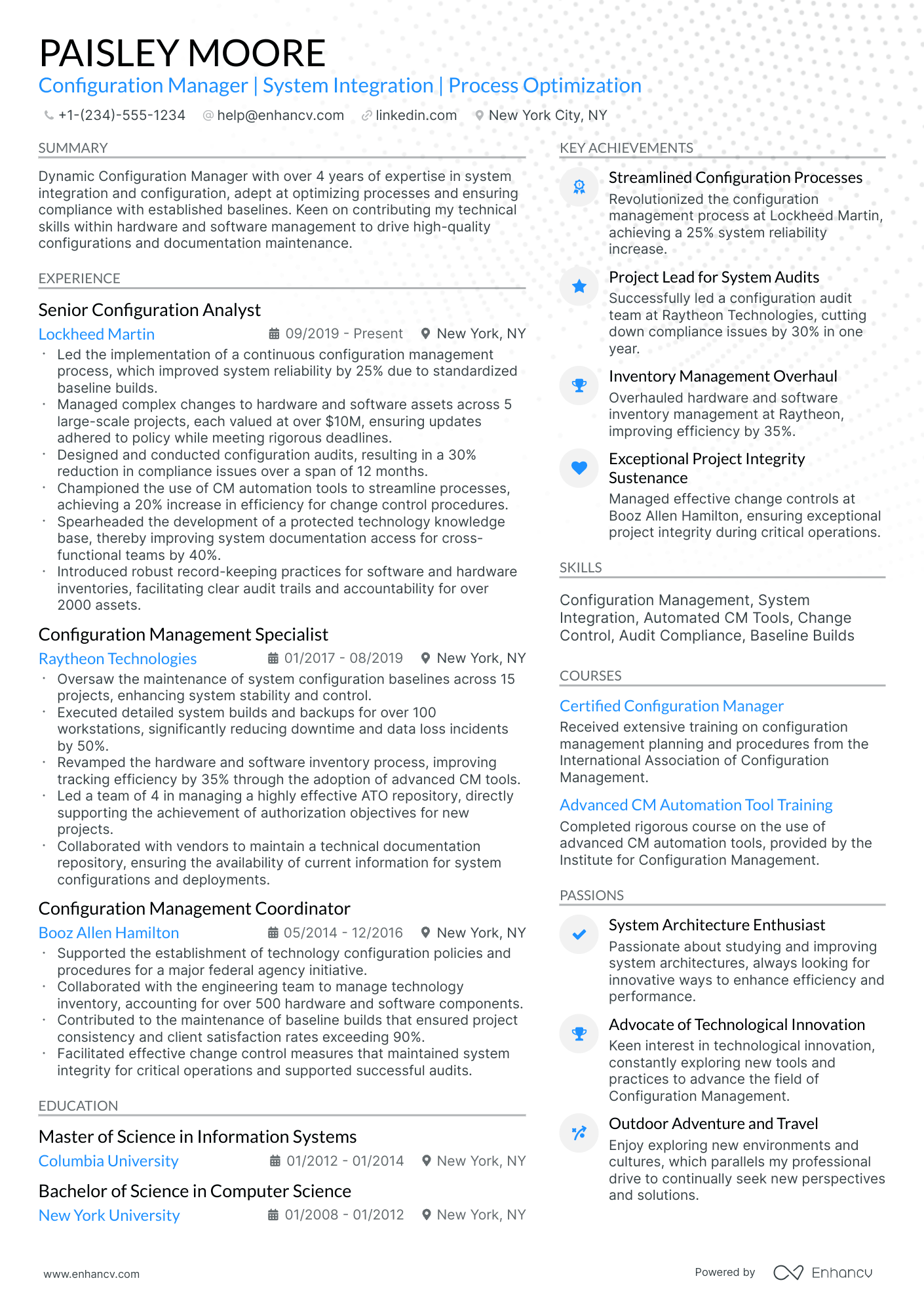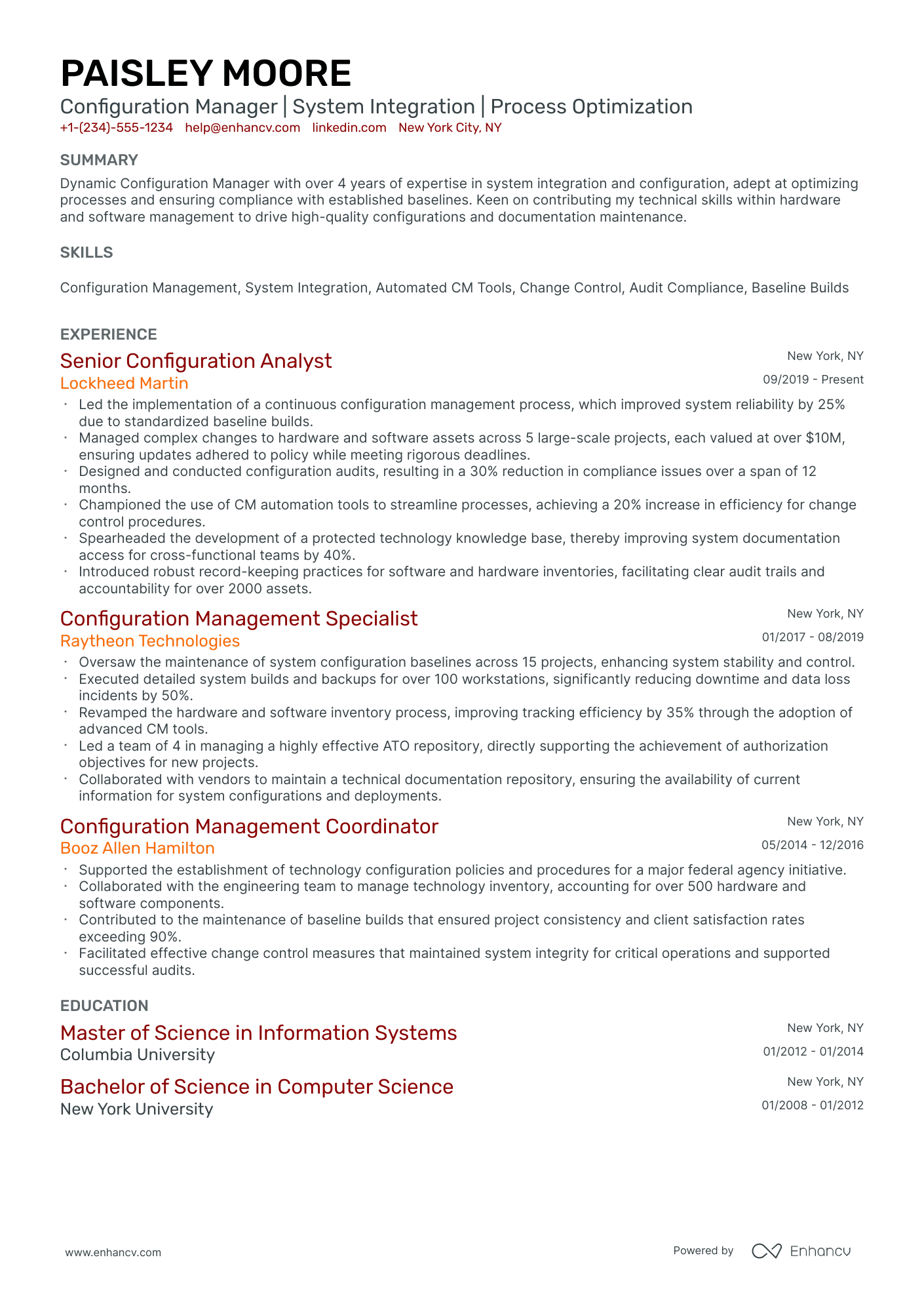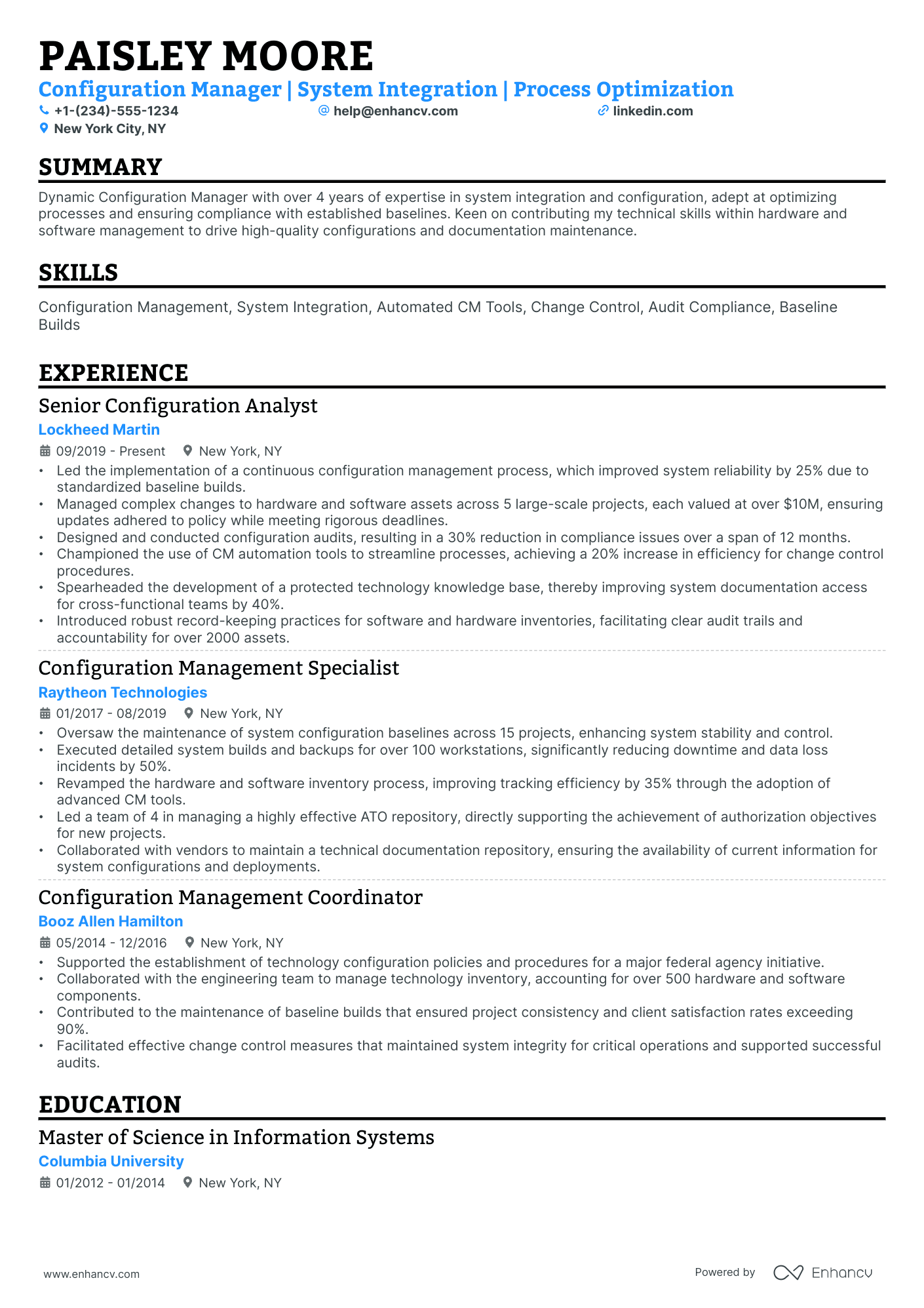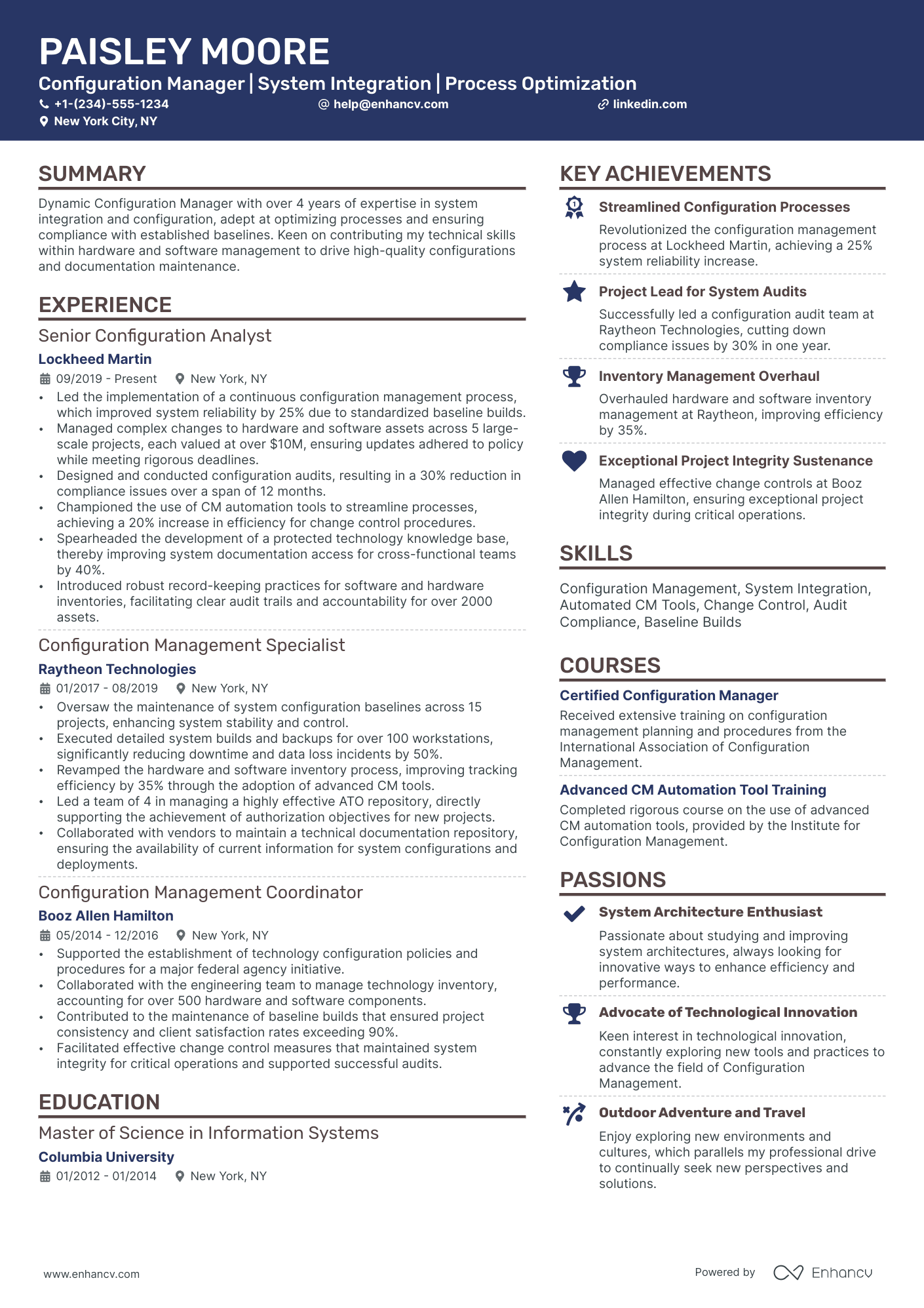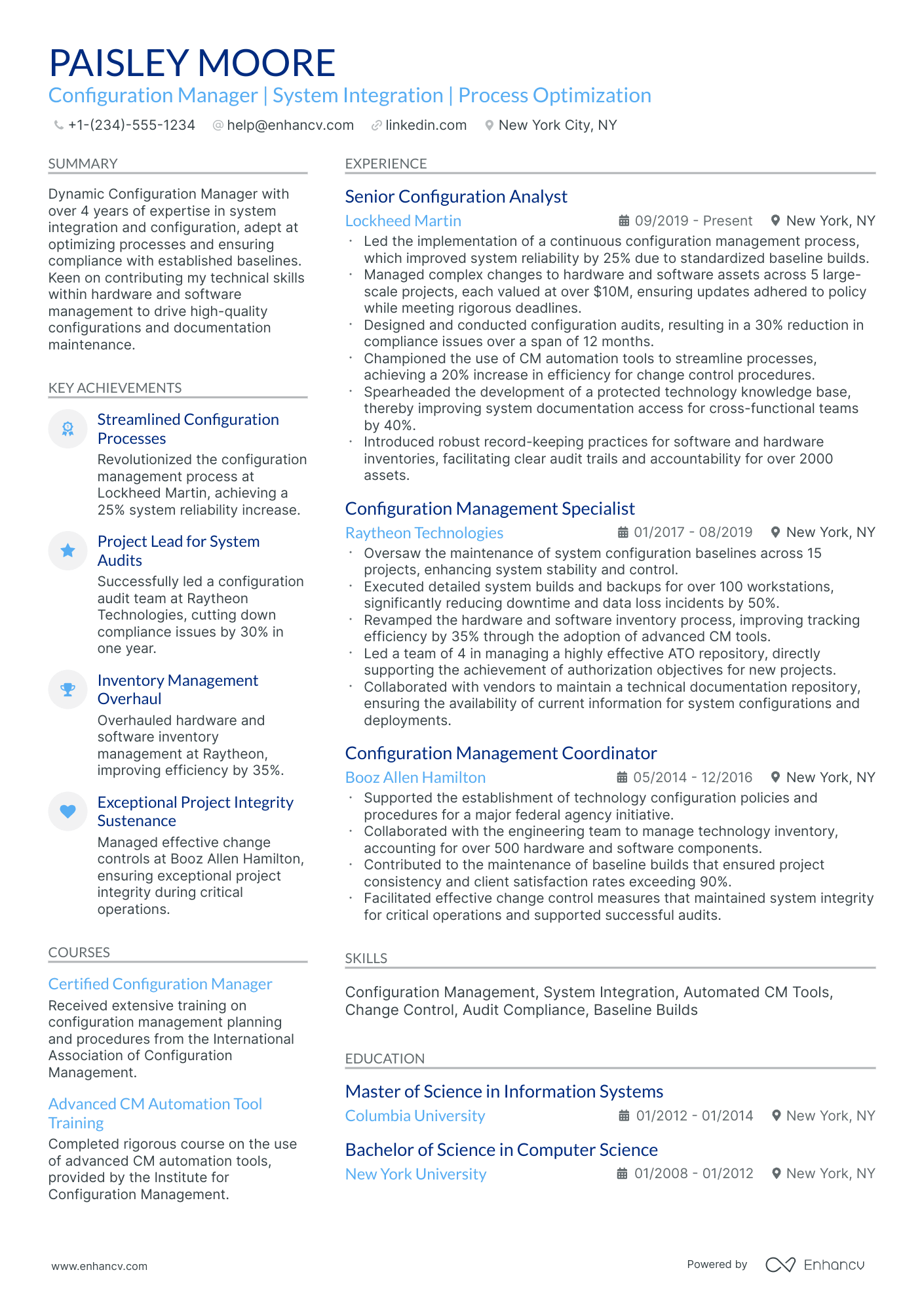As a configuration manager, you might find it challenging to effectively showcase your cross-functional expertise and technical skills on a concise one-page resume. Our guide provides tailored strategies that will help you highlight your achievements and capabilities, ensuring your resume stands out to potential employers in your field.
- Utilize real-life examples to refine your configuration manager resume;
- Effectively write the experience section of your configuration manager resume, even if you have minimal or no professional experience;
- Incorporate the industry's top 10 essential skills throughout your resume;
- Include your education and certifications to highlight your specific expertise.
If the configuration manager resume isn't the right one for you, take a look at other related guides we have:
- Library Manager Resume Example
- Branch Manager Resume Example
- SAP Business Analyst Resume Example
- Resource Manager Resume Example
- Implementation Manager Resume Example
- Claims Manager Resume Example
- Warehouse Operations Manager Resume Example
- Hotel Operations Manager Resume Example
- Senior Business Analyst Resume Example
- Business Development Executive Resume Example
Best practices for the look and feel of your configuration manager resume
Before you even start writing your configuration manager resume, first you need to consider its layout and format.
What's important to keep in mind is:
- The reverse-chronological resume is the most widely used format to present your experience, starting with your latest job.
- Your configuration manager resume header needs to include your correct, professional contact details. If you happen to have a professional portfolio or an updated LinkedIn profile, include a link to it.
- Ensure your resume is no longer than two pages - you don't have to include irelevant experience on your resume just to make it look longer.
- Unless specified otherwise, submit your resume in the most popular format, the PDF one, as this will ensure your configuration manager resume isn't altered.
Keep in mind the market you’re applying to – a Canadian resume, for instance, might have a unique layout.
Upload & Check Your Resume
Drop your resume here or choose a file. PDF & DOCX only. Max 2MB file size.
PRO TIP
Highlight any significant extracurricular activities that demonstrate valuable skills or leadership.
Don't forget to include these six sections on your configuration manager resume:
- Header and summary for your contact details and to highlight your alignment with the configuration manager job you're applying for
- Experience section to get into specific technologies you're apt at using and personal skills to deliver successful results
- Skills section to further highlight how your profile matches the job requirements
- Education section to provide your academic background
- Achievements to mention any career highlights that may be impressive, or that you might have missed so far in other resume sections
What recruiters want to see on your resume:
- Demonstrable experience with configuration management tools such as Ansible, Puppet, Chef, or SaltStack.
- Understanding of version control systems like Git, SVN, or Mercurial.
- Familiarity with continuous integration/continuous deployment (CI/CD) processes and tools.
- Proficiency in automating and streamlining build, test, and deployment systems.
- Knowledge of software development life cycles, coding standards, code reviews, source control management, build processes, and operations.
Experts' advice on writing your configuration manager resume experience
While the excitement and motivation for writing your configuration manager resume was present in the first hour (or so), you now find yourself staring at the blank page.
The resume experience section is the one that allows you to make a memorable impression by matching job requirement with your past jobs and accomplishments.
To help you write this resume section, here are four mistakes you need to avoid:
- Listing every job you have had so far, including the irrelevant ones. Before that, consider each of your past roles based on relevancy to the role. It may be the case that the job you had 15 years ago may have taught you invaluable skills that are appropriate for the role;
- Including irrelevant work experience items. Those are past jobs that aren't linked with the role you're applying for (or so they seem). Consider how your past jobs will serve your professional presentation: will they be filling in a gap in your work history, or just taking up space?
- Focusing on responsibilities instead of accomplishments. Your configuration manager resume shouldn't just be telling recruiters what you did in the past - as it's most often the case that candidates have had similar responsibilities. But, rather, the experience section should showcase the success you've attained in each past role, thanks to your unique skill set;
- Consider listing just your professional experience. Any role you've had in the past - e.g. volunteering, internships, etc. - can make it into your configuration manager resume experience section. Make sure to include it alongside numbers and results.
Two more things you need to remember about your resume experience section.
The first are keywords. Or those specific job requirements that are crucial for the role . Ensure you've integrated them across your experience section to get sorted closer to the ideal candidate profile by the Applicant Tracker System (ATS).
The second are action verbs. Each of your experience bullets should start with a strong action verb, followed by your specific skill and your on the job achievements. Follow this formula to hint to recruiters what your unique value as a professional is.
Still with us? In the next section, we will show you how industry-leading professionals have avoided the four most common mistakes, while integrating keywords and action verbs in their experience section.
- Led the development and implementation of a comprehensive configuration management plan for a complex software system, improving system reliability by 30%.
- Coordinated with cross-functional teams, including development, quality assurance, and operations to ensure seamless integration of configuration management processes.
- Defined and enforced configuration management policies for version control, build and release management, which reduced unauthorized changes by 40%.
- Conducted detailed audits and analyses of configurations management practices leading to a 25% improvement in compliance with industry standards.
- Created and managed baseline configurations for multiple projects, improving the deployment success rate by 35%.
- Trained and mentored junior configuration managers and staff, which increased team productivity and expanded the knowledge base.
- Successfully managed the configuration of over 200 projects across the enterprise, streamlining the process and enhancing operational efficiency.
- Directed the transition to a new automated configuration management tool, which reduced manual work by 50% and minimized human errors.
- Implemented a change control board that included stakeholder representation from all key departments, improving inter-departmental communication and decision-making.
- Designed and deployed a customized configuration management database (CMDB), that centralized asset management and provided a clear 360-degree view of IT resources.
- Drove key initiatives resulting in the improvement of configuration management systems which enhanced system availability and performance by 20%.
- Organized training programs boosting the competencies of stakeholders in configuration management tools and best practices.
- Developed an innovative approach to manage configurations across distributed environments, reducing downtime during deployments by 40%.
- Collaborated with product management to align configuration management processes with customer requirements, ensuring a customer satisfaction rating of over 90%.
- Managed and optimized confiuration control procedures which enhanced team response times to critical system updates by 25%.
- Supervised the integration of configuration management with continuous integration/continuous deployment pipelines, accelerating release cycles by 30%.
- Developed metrics and reports to reflect the health of the configuration management process, providing management with transparency and control over system changes.
- Fostered a culture of continuous improvement by conducting regular review sessions on the configuration management process, leading to a 15% increase in process efficiency.
- Orchestrated the upgrade of configuration management systems to support evolving technical requirements, which increased system compatibility by 50%.
- Established an automated process for tracking and reporting on the status of configuration items which decreased manual oversight efforts by 60%.
- Led the successful implementation of a company-wide configuration management initiative that standardized tools and processes across multiple departments.
- Implemented a version control system that managed software revisions and documentation for a team of 250, significantly reducing version conflicts and enhancing collaboration.
- Identified key process improvements in the existing configuration management workflow, leading to a 20% reduction in operational costs.
- Coordinated with project managers and technical leads to ensure that all deliverable configurations align with project milestones and customer expectations.
Quantifying impact on your resume
- Include the number of version control systems you have managed, highlighting your capability to handle complex configuration environments.
- Specify the exact percentage of reduction in downtime or deployment failures due to your configuration management strategies.
- List the number of automated processes you implemented for configuration management, demonstrating your efficiency improvements.
- Detail the size of the software and hardware inventory you maintained to showcase your organizational skills and attention to detail.
- Mention the total number of environments you supported, underscoring your versatility and breadth of experience.
- Quantify any cost savings achieved through improved configuration management practices, showing your direct impact on the bottom line.
- Provide the number of compliance audits successfully passed as a direct result of your configuration management policies and procedures.
- Report on the scale of cross-team collaborations you've facilitated through configuration management, indicating your leadership and teamwork capabilities.
Action verbs for your configuration manager resume
Making the most of your little to none professional experience
If you're hesitant to apply for your dream job due to limited professional experience, remember that recruiters also value the unique contributions you can offer.
Next time you doubt applying, consider this step-by-step approach for your resume's experience section:
- Rather than the standard reverse chronological order, opt for a functional-based format. This shifts the focus from your work history to your achievements and strengths;
- Include relevant internships, volunteer work, or other non-standard experiences in your configuration manager resume's experience section;
- Utilize your education, qualifications, and certifications to bridge gaps in your configuration manager resume experience;
- Emphasize your interpersonal skills and transferable skills from various industries. Often, recruiters seek a personality match, giving you an advantage over other candidates.
Recommended reads:
PRO TIP
If you failed to obtain one of the certificates, as listed in the requirements, but decide to include it on your resume, make sure to include a note somewhere that you have the "relevant training, but are planning to re-take the exams". Support this statement with the actual date you're planning to be re-examined. Always be honest on your resume.
Configuration manager skills and achievements section: must-have hard and soft skills
A key principle for your configuration manager resume is to prominently feature your hard skills, or the technologies you excel in, within the skills section. Aim to list several hard skills that are in line with the job's requirements.
When it comes to soft skills, like interpersonal communication abilities and talents, they're trickier to quantify.
Claiming to be a good communicator is one thing, but how can you substantiate this claim?
Consider creating a dedicated "Strengths" or "Achievements" section. Here, you can describe how specific soft skills (such as leadership, negotiation, problem-solving) have led to concrete achievements.
Your configuration manager resume should reflect a balanced combination of both hard and soft skills, just as job requirements often do.
Top skills for your configuration manager resume:
Configuration Management Tools (e.g., Puppet, Chef, Ansible)
Version Control Systems (e.g., Git, Subversion)
Scripting Languages (e.g., Bash, Python, PowerShell)
CI/CD Tools (e.g., Jenkins, GitLab CI, Travis CI)
Containerization Technologies (e.g., Docker, Kubernetes)
Cloud Platforms (e.g., AWS, Azure, Google Cloud)
Infrastructure as Code (e.g., Terraform, CloudFormation)
Operating Systems (e.g., Linux, Windows Administration)
Monitoring Tools (e.g., Nagios, Prometheus, Grafana)
Database Management (e.g., SQL, NoSQL databases)
Problem Solving
Attention to Detail
Communication Skills
Team Collaboration
Time Management
Adaptability
Critical Thinking
Project Management
Analytical Skills
Conflict Resolution
PRO TIP
List all your relevant higher education degrees within your resume in reverse chronological order (starting with the latest). There are cases when your PhD in a particular field could help you stand apart from other candidates.
What are the best certificates to add to your configuration manager resume + how to curate your education section
The education and certification resume sections are the underdogs of your configuration manager resume.
They showcase to recruiters that you've invested plenty of time to gain valuable and specific know-how, vital for growth.
As far as the resume education section is concerned:
- Detail only advanced education, specifying the institution and timeframe.
- Indicate your forthcoming graduation date if you're in the midst of your studies.
- Consider omitting degrees that don't align with the job's requirements.
- Offer a description of your academic journey if it underscores your notable achievements.
When curating your degrees and certificates on your configuration manager resume:
- Select only accreditation that matters to the role
- Niche knowledge that could help you stand out as a candidate (as is within the past few years), should be listed towards the top of your resume
- Include any pertinent data for credibility (e.g. institute name, graduation dates, etc.)
- Irrelevant degrees and certifications shouldn't make it on your resume. Those include your high school diploma and any specializations that have nothing to do with the technical or soft skills that are required for the job
As a final note, if you feel tempted to exclude your education or certification from your resume, don't.
These two sections could help you have a better competitive edge over other candidates - hinting that your professional journey in the industry may be for a longer period of time.
Recruiters find all of these configuration manager credentials impressive:
The top 5 certifications for your configuration manager resume:
- Certified configuration manager (CCM) - Institute of Configuration Management (ICM)
- Project Management Professional (PMP) - Project Management Institute (PMI)
- Information Technology Infrastructure Library (ITIL) Certification - AXELOS Global Best Practice
- CompTIA Security+ - Computing Technology Industry Association (CompTIA)
- Certified Information Systems Security Professional (CISSP) - International Information System Security Certification Consortium (ISC)²
PRO TIP
If the certificate you've obtained is especially vital for the industry or company, include it as part of your name within the resume headline.
Recommended reads:
Adding a summary or objective to your configuration manager resume
One of the most crucial elements of your professional presentation is your resume's top one-third. This most often includes:
- Either a resume summary - your career highlights at a glance. Select the summary if you have plenty of relevant experience (and achievements), you'd like recruiters to remember about your application.
- Or, a resume objective - to showcase your determination for growth. The perfect choice for candidates with less experience, who are looking to grow their career in the field.
If you want to go above and beyond with your configuration manager resume summary or resume objective, make sure to answer precisely why recruiters need to hire you. What is the additional value you'd provide to the company or organization? Now here are examples from real-life configuration manager professionals, whose resumes have helped them land their dream jobs:
Resume summaries for a configuration manager job
- Seasoned configuration manager with over 12 years of experience in high-tech environments, adept at overseeing complex system configurations and enhancements. Boasts a masterful command of version control tools like Git and Subversion, and has a track record of reducing deployment errors by 45% through meticulous configuration management strategies.
- Diligent IT professional with a decade of experience managing software configurations across multiple platforms, seeking to leverage extensive background in automated build systems and continuous integration in a challenging configuration management role. Successfully implemented a company-wide automated build system, increasing deployment efficiency by 30%.
- Dynamic professional with a strong foundation in mechanical engineering, seeking to transition into configuration management. Brings a fresh perspective with a robust understanding of product lifecycle management and CAD tools. Proven ability to lead cross-functional teams in streamlining design processes during a 5-year tenure at a leading manufacturing firm.
- Experienced project manager with expertise in logistics and supply chain management, eager to apply organizational and analytical skills in a configuration management setting. Recognized for redesigning inventory tracking systems that enhanced operational efficiency by 20% and is now pursuing an opportunity to leverage this experience in the tech industry.
- Highly motivated graduate with a Bachelor's in Computer Science, eager to embark on a career in configuration management. With a profound interest in software development processes and solid intern experience in version control systems, I am committed to contributing to the smooth management of software configurations and release processes.
- As a recent certification recipient in IT Service Management, I am keen to apply theoretical knowledge and passion for technology in practicing configuration management. Aim to cultivate hands-on experience and contribute to robust configuration processes while fostering continuous improvement and operational excellence.
Taking your configuration manager resume to the next level with these four additional resume sections
Your configuration manager resume can feature a variety of skills (both hard and soft) in diverse sections. Choose those that align best with the job requirements and reflect your suitability for the company culture.
Consider these four additional resume sections recommended by our experts:
- Languages - State any languages you are proficient in and your level of proficiency. This demonstrates your commitment to communication and potential for international growth.
- Projects - Highlight up to three significant projects you've completed outside of work, showcasing skill development. Include a link to your project portfolio in the configuration manager resume header, if applicable.
- My Time - How you allocate your time outside work can indicate your organizational skills and cultural fit within the company.
- Volunteering - Detail causes you're passionate about, roles you've held, and achievements in volunteering. Such experiences likely have honed a range of soft skills crucial for your dream job.
Key takeaways
Securing your ideal job starts with crafting a compelling configuration manager resume. It should not only highlight your professional strengths but also reflect your personality. Key aspects to remember include:
- Choose a clear, easily editable format, allowing more time to focus on the content of your resume;
- Emphasize experience relevant to the job, focusing on your impact on the team;
- Opt for a resume summary if you have extensive professional experience, and a resume objective if you're just starting out;
- Include technical skills in the skills section and interpersonal skills in the achievements section;
- Recognize the importance of various resume sections (e.g., My Time, Projects) in showcasing both your professional abilities and personal traits.
